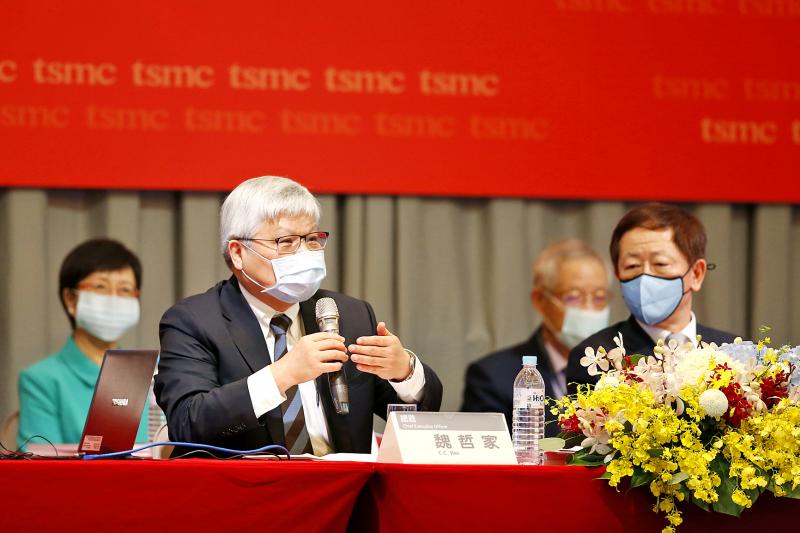Taiwan Semiconductor Manufacturing Co (TSMC, 台積電) yesterday left its record capital expenditures plan unchanged for this year as robust client demand for 5-nanometer technology is expected to quickly fill a capacity hole after the US government announced restrictions against supplying Huawei Technologies Co (華為).
The world’s biggest contract chipmaker had said that it planned to spend between US$15 billion and US$16 billion this year primarily to expand capacity for advanced 5-nanometer and 7-nanometer technologies, and develop 3-nanometer technology.
“It looks like we will see a hole in demand for 5-nanometer capacity this year, but I believe this hole will soon be filled,” TSMC chairman Mark Liu (劉德音) told a media briefing after the company’s annual shareholders’ meeting in Hsinchu.

Photo: Ashley Pon, Bloomberg
If HiSilicon Technologies Co (海思), a semiconductor arm of Huawei, cancels orders, TSMC’s other clients would make up for that lost capacity, as they have approached the company about placing orders, Liu said in response to shareholder concern that the US’ latest chip supply restrictions on foreign chipmakers might put a damper on TSMC’s revenue growth.
TSMC’s 5-nanometer technology is the most advanced technology available, and HiSilicon, Apple Inc and Advanced Micro Devices Inc are typically early adopters of the company’s most advanced technologies.
“We are not going to alter our capital spending for this year, nor are we going to revise our revenue growth outlook for this year,” Liu said.
However, he said that the chipmaker is facing challenges due to US-China trade tensions.
TSMC in April slightly trimmed its revenue growth for this year to an annual expansion of 15 to 18 percent, down from a previous forecast of more than 17 percent, as the COVID-19 pandemic dampened demand for smartphones.
The pandemic has not sidetracked the chipmaker’s upgrade to 5-nanometer and 3-nanometer technologies, Liu said.
Mass production of 3-nanometer technology would start as planned in the second half of 2022, with 4-nanometer technology, an enhanced version of 5-nanometer technology, being mass produced in 2023, Liu added.
Officials also discussed a plan to build a US$12 billion fab in Arizona, as shareholders expressed concern that the investment would weigh on profitability.
Subsidies from the US federal and state governments would be a determining factor in the final decision to build the fab, Liu said, adding that TSMC has not yet signed a formal agreement with US authorities.
“If the US [federal and state] governments are willing to cover our running costs, our profit margin will not be affected,” Liu said.
In such a case, the Arizona fab would definitely make a profit, as its gross margin would be similar to that of the corporate level of the company, he said.
TSMC said that the US subsidies are a crucial component of its plan to construct the fab, adding that it hopes subsidies would make US manufacturing costs comparable to those in Taiwan and China.
The firm’s raw material suppliers, such as chemicals and special gas companies, also plan to build production lines in Arizona, where Intel Corp and several other semiconductor firms have built a solid supply chain, Liu said.
TSMC shares yesterday closed up 0.31 percent at NT$319 in Taipei trading.

In Italy’s storied gold-making hubs, jewelers are reworking their designs to trim gold content as they race to blunt the effect of record prices and appeal to shoppers watching their budgets. Gold prices hit a record high on Thursday, surging near US$5,600 an ounce, more than double a year ago as geopolitical concerns and jitters over trade pushed investors toward the safe-haven asset. The rally is putting undue pressure on small artisans as they face mounting demands from customers, including international brands, to produce cheaper items, from signature pieces to wedding rings, according to interviews with four independent jewelers in Italy’s main

Macronix International Co (旺宏), the world’s biggest NOR flash memory supplier, yesterday said it would spend NT$22 billion (US$699.1 million) on capacity expansion this year to increase its production of mid-to-low-density memory chips as the world’s major memorychip suppliers are phasing out the market. The company said its planned capital expenditures are about 11 times higher than the NT$1.8 billion it spent on new facilities and equipment last year. A majority of this year’s outlay would be allocated to step up capacity of multi-level cell (MLC) NAND flash memory chips, which are used in embedded multimedia cards (eMMC), a managed

In the wake of strong global demand for AI applications, Taiwan’s export-oriented economy accelerated with the composite index of economic indicators flashing the first “red” light in December for one year, indicating the economy is in booming mode, the National Development Council (NDC) said yesterday. Moreover, the index of leading indicators, which gauges the potential state of the economy over the next six months, also moved higher in December amid growing optimism over the outlook, the NDC said. In December, the index of economic indicators rose one point from a month earlier to 38, at the lower end of the “red” light.

The global server market is expected to grow 12.8 percent annually this year, with artificial intelligence (AI) servers projected to account for 16.5 percent, driven by continued investment in AI infrastructure by major cloud service providers (CSPs), market researcher TrendForce Corp (集邦科技) said yesterday. Global AI server shipments this year are expected to increase 28 percent year-on-year to more than 2.7 million units, driven by sustained demand from CSPs and government sovereign cloud projects, TrendForce analyst Frank Kung (龔明德) told the Taipei Times. Demand for GPU-based AI servers, including Nvidia Corp’s GB and Vera Rubin rack systems, is expected to remain high,